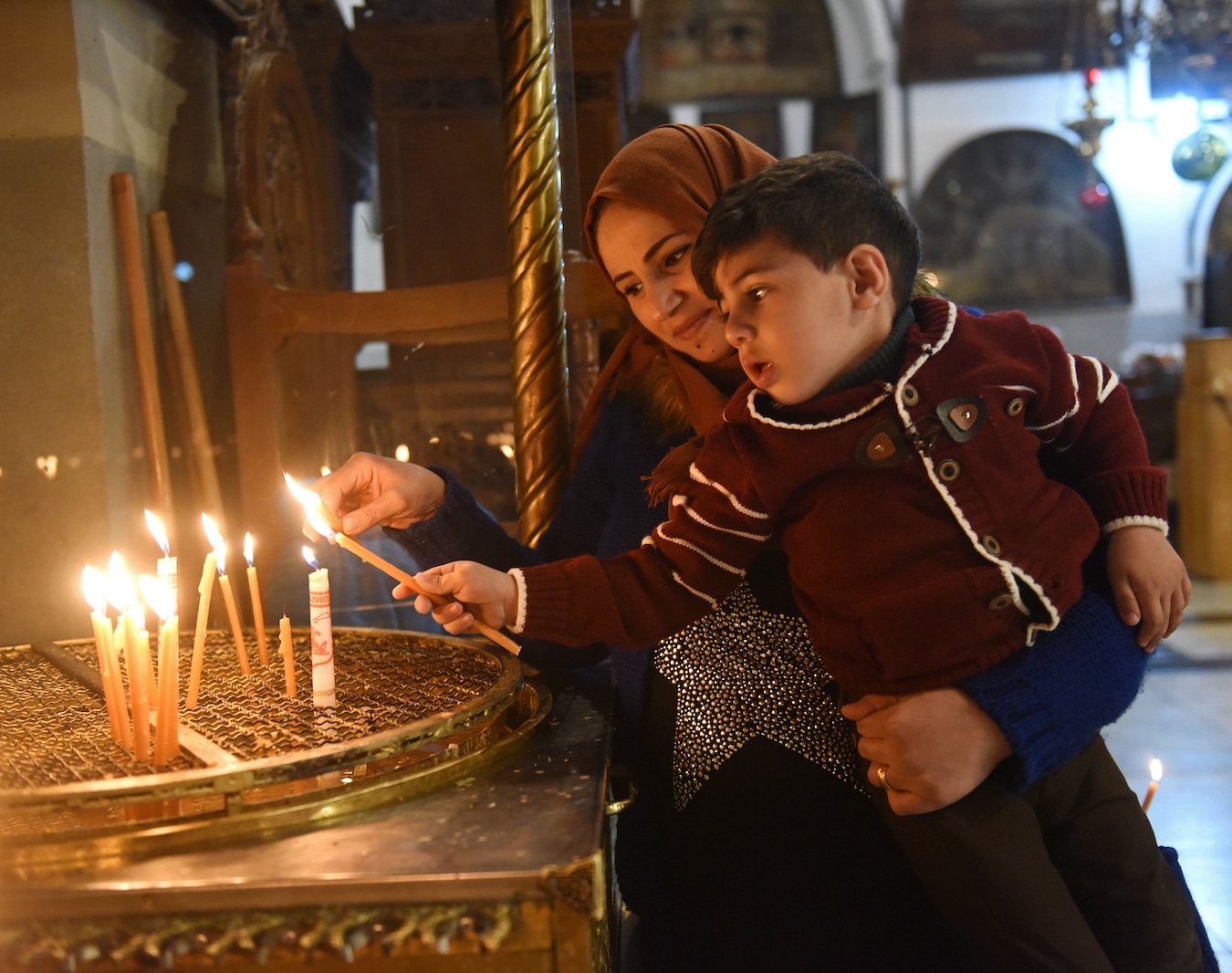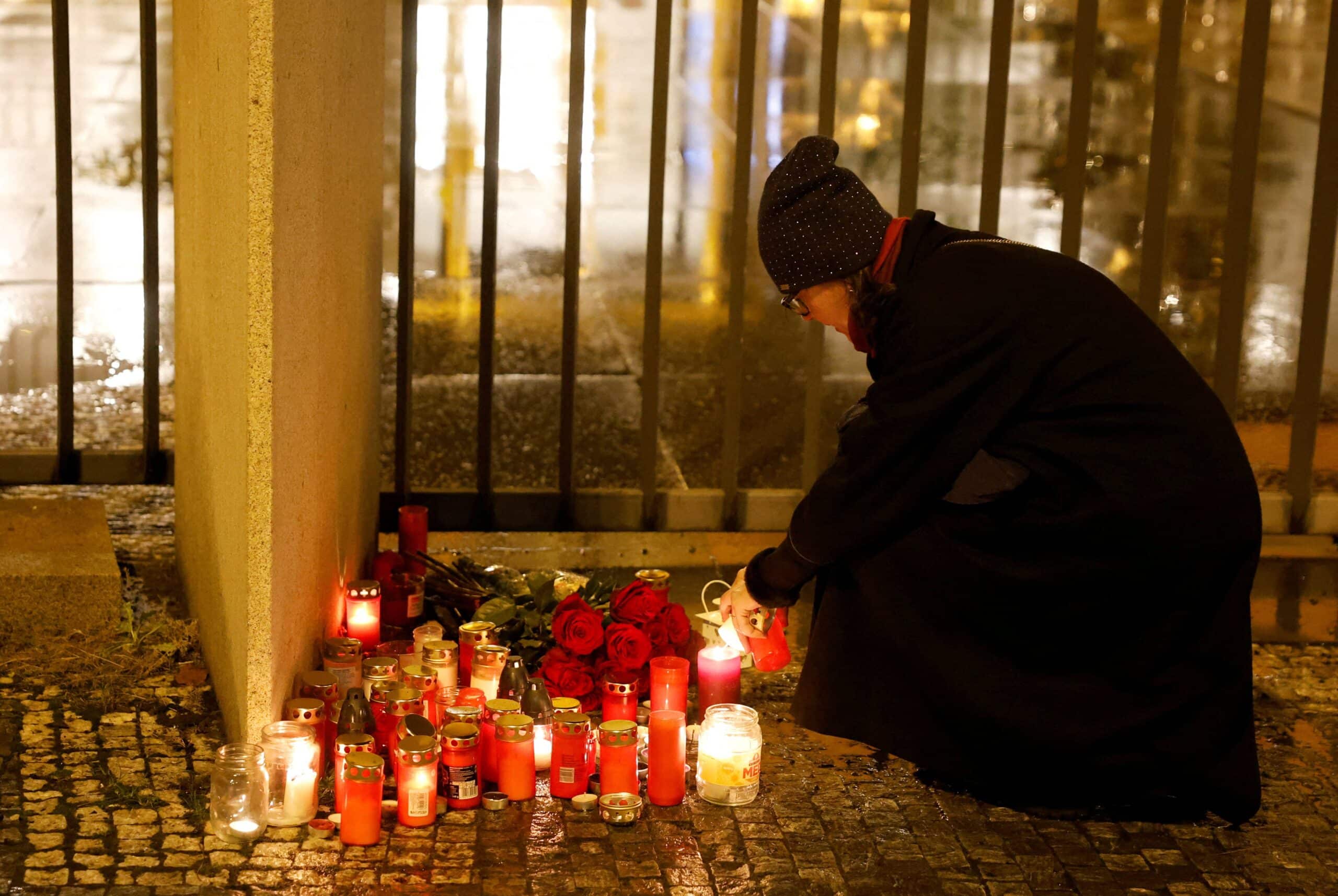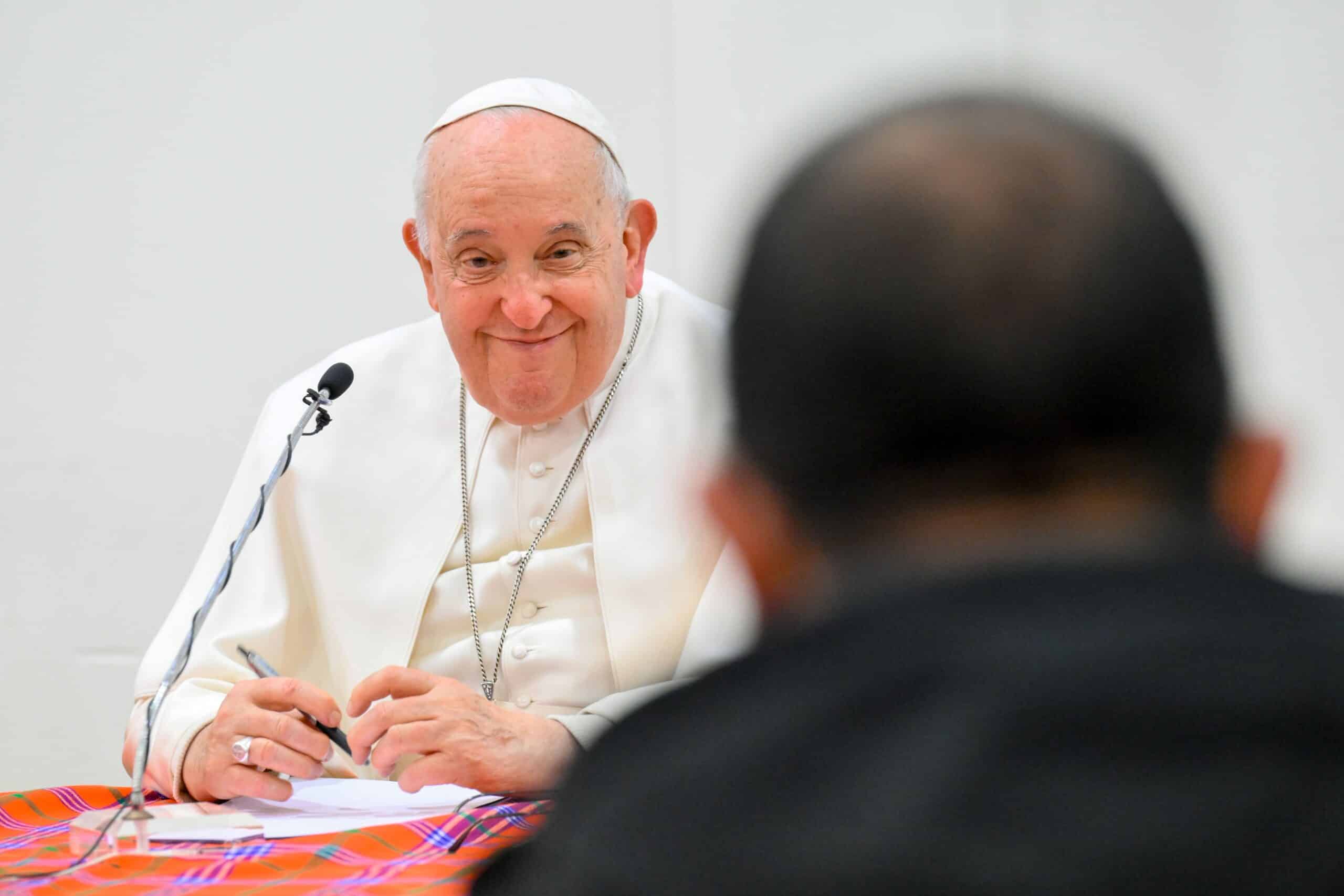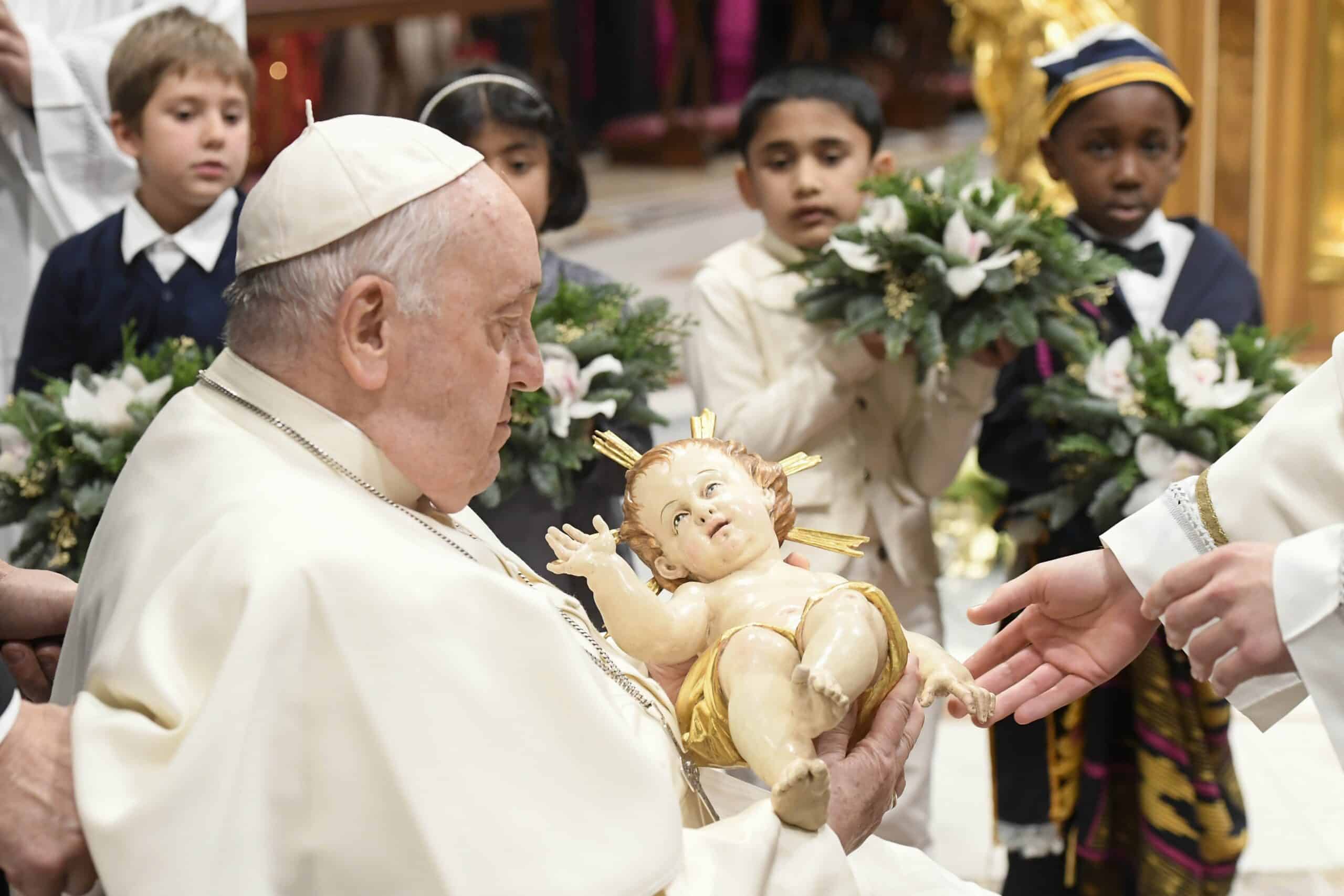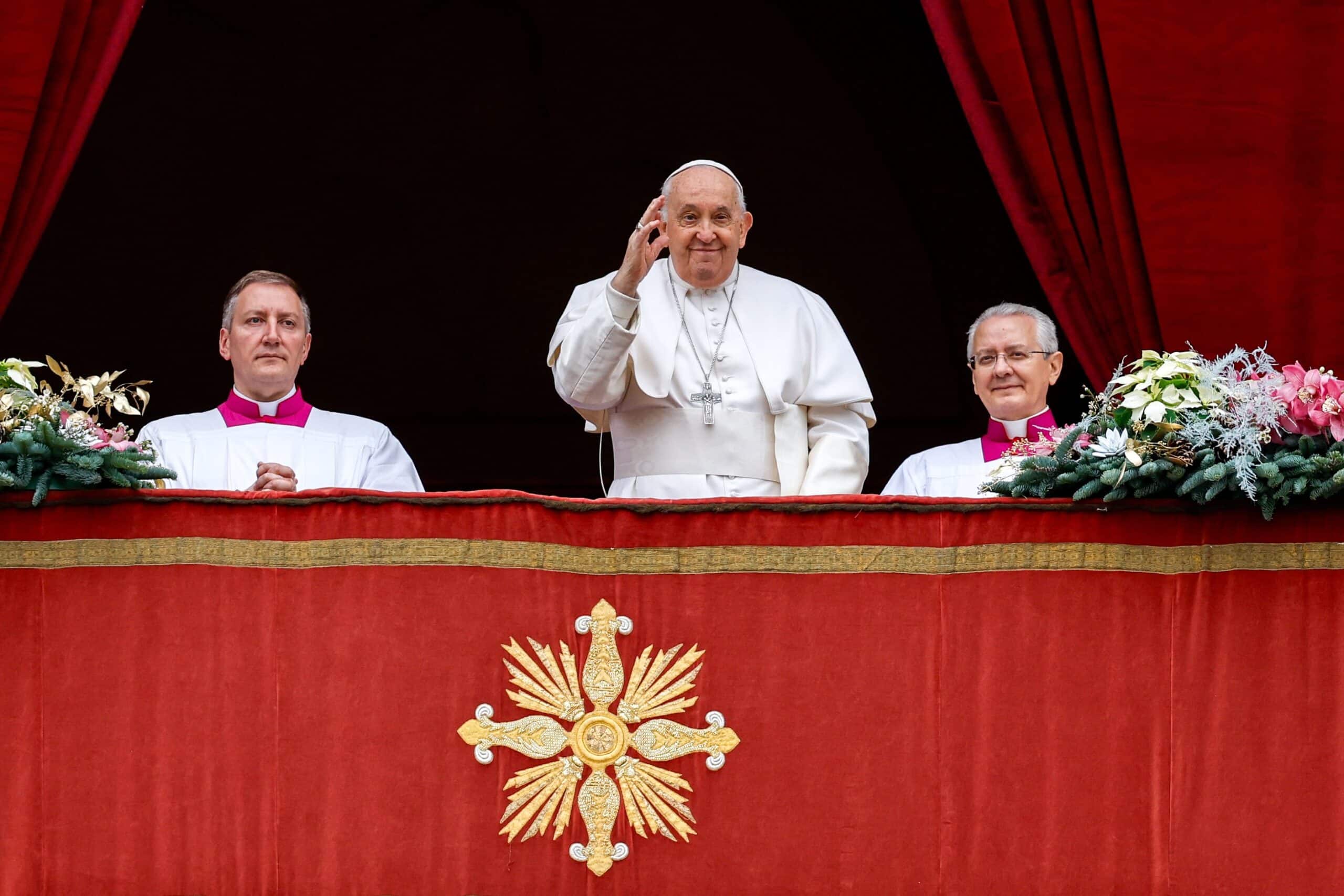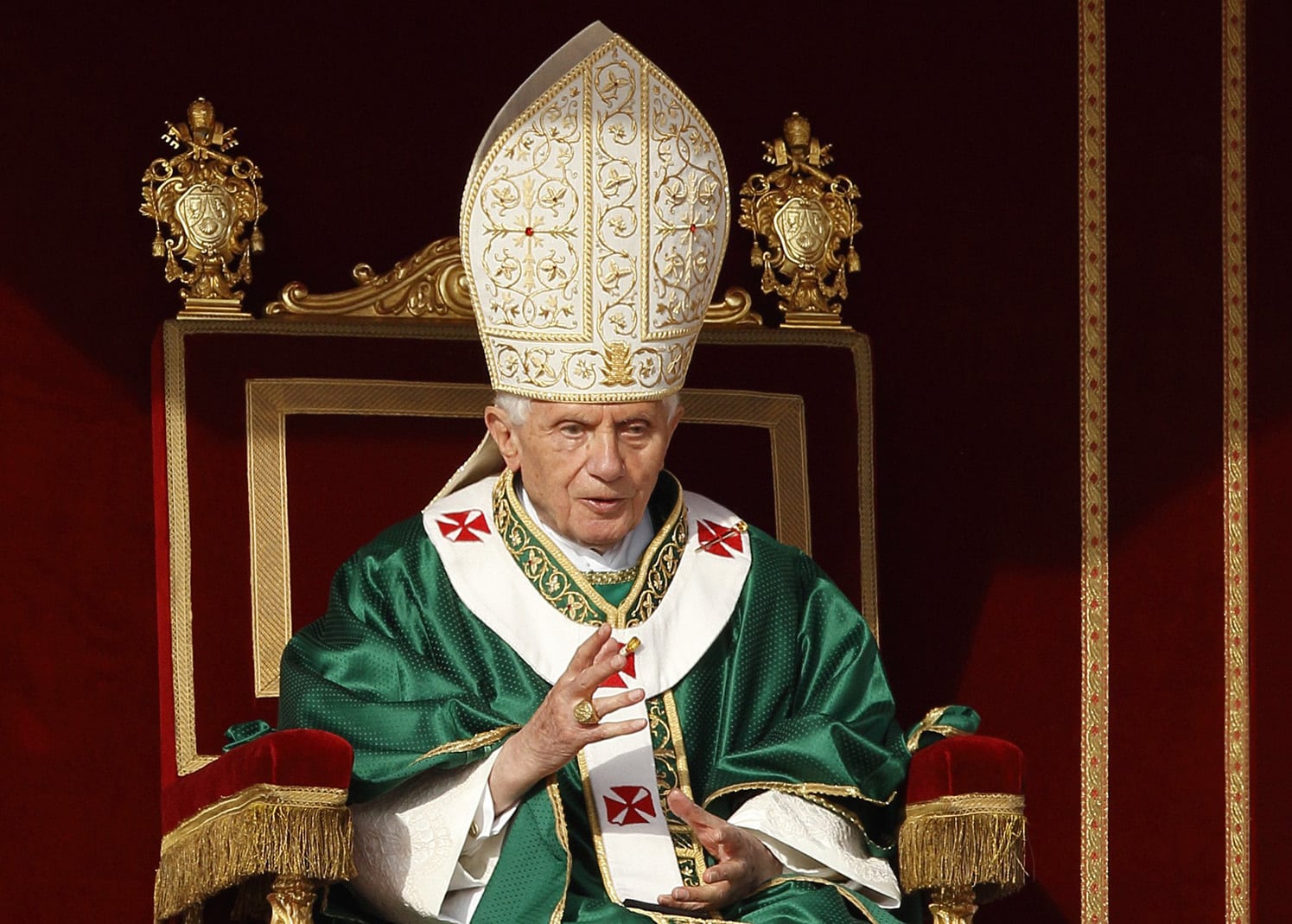Wood and iron for reinforced concrete form silhouettes like skeletons against the blue sky in early December. At 28, Tony, a craftsman from Beit Sahour, near Bethlehem, dreams of getting married. “Every time I start work to build my apartment above my father’s house, something happens, and I have to stop everything: first the pandemic, now the war.” And each time, it leads to arguments with his girlfriend.
Tony’s father before him was also a wood artisan. A few years ago, Tony decided to embark on this venture along with his brother and some friends. We reached him in his workshop. In normal times, it supports three families. However, with the war and the absence of pilgrims, work has come to a standstill. “We continue production because we cannot afford to be without work; we have to try to sell. But I can’t see my future here,” he said, disheartened. Would he leave his homeland? “Yes, even right now.”
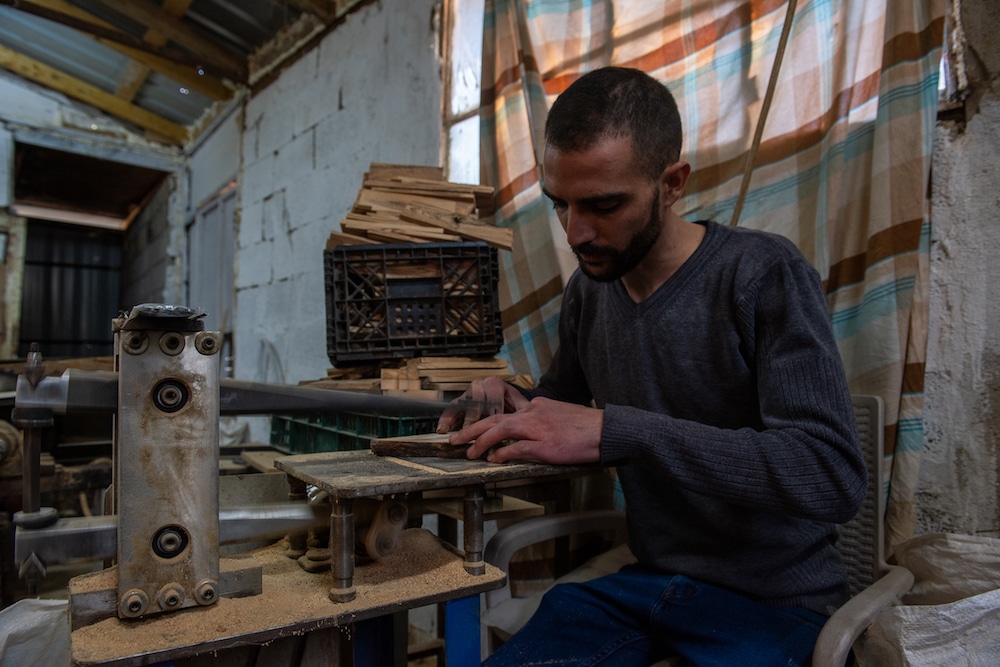
Next to the Basilica of the Nativity, Roni Tabash continues to run the family business, one of the best-known in the city. Typically, he shares, “during this time of year, the large Christmas tree of Bethlehem is set up just a few yards away. However, our true joy is not the Christmas tree. Our real joy is to let hope enter every sad heart in this very difficult situation.” For almost a hundred years, Roni’s store has been selling handmade items crafted by local artisans, including Tony. “We provide employment for 25 families, over a hundred people. Take a rosary: there are those who make the beads, those who craft the crosses, others handle assembly, and some take care of packaging for shipping. Behind this small item, four families can earn a dignified living through their work,” Roni said. With the city empty, the only hope for sales lies in orders from abroad. How can one help? “The cost of shipping has doubled. What is needed are substantial orders, perhaps from parishes, groups, and associations that can afford to buy in large quantities,” Roni said.
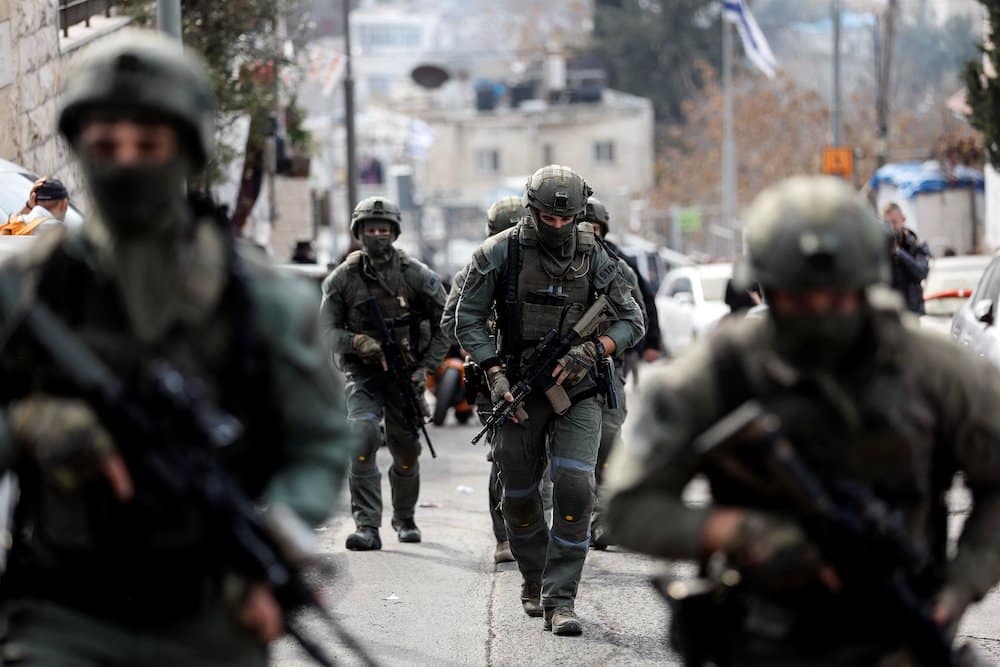
The weight of war
This Christmas, Bethlehem, the place where Jesus was born, is a city weighed down by the consequences of war. Though not directly impacted by the fighting, the lack of tourism — which constitutes the livelihood for 60% to 70% of the population — has had immediate consequences precipitating a collapse in employment and a spike in prices, even for essential goods. For Christmas decorations and gifts, the budget is almost nonexistent. No one feels like celebrating, at least not publicly.
Since the beginning of the war, it’s almost impossible to enter and leave the city: Israel has closed all the main access roads. The main entry point to Bethlehem, Checkpoint 300, has been closed to vehicular traffic since Oct. 7. Entry from Jerusalem is still allowed on foot, but for some weeks it’s only been possible to leave Bethlehem from 5 a.m. to 9 a.m. (with valid permits). Permits for Palestinians working in Jerusalem were suspended from the first day of the war, leading to severe economic repercussions. Only a few weeks ago, entry into Israel was allowed for some categories of Palestinian workers, including those associated with Christian churches.
“Our real joy is to let hope enter every sad heart in this very difficult situation.”
— Roni Tabash
Due to the ongoing conflict, Christmas celebrations have taken on more sober contours, in line with the directives of the Patriarchs and Heads of the Churches in Jerusalem to “forego any unnecessarily festive activities” and “focus more on the spiritual meaning of Christmas.” This year, Manger Square, the square located in front of the Basilica of the Nativity, is bereft of its grand Christmas tree, and the suspended lights above the square have been dismantled. Many, in hushed tones, whisper their fear of being the next targets in a war marked by murky boundaries and no end in sight. A pervasive sense of sorrow blankets everything, accompanied by an air of uncertainty about what the future may hold.
But upon closer inspection, beneath this veil of sadness, lights shine. These lights — education, mercy, family andfaith — are small lights, sometimes unknowingly lit or fed. But it’s well known that when shrouded in darkness, even a single flame is enough to provide warmth and hope.
The light of learning
Just a few steps from the Basilica of the Nativity, the Terra Sancta College of the Custody of the Holy Land welcomes around 1,200 children and teenagers (from 3 years old to 18 years old) from the entire Bethlehem area. Sixty percent of the students are Christians, 40% are Muslims. Many families struggle to pay school fees (ranging from $500 to $1,000 dollars per child annually) because many have lost their jobs. We enter this institute — the oldest in the Middle East — founded by the Franciscans in 1598. In the atrium, there is a Christmas tree wrapped in the Palestinian flag, a sign of solidarity with those who live and suffer in Gaza. Here, too, Christmas will be different this year, marked by simple decorations and gifts. Only in the kindergarten classroom do decorations and Christmas activities abound so as not to take away the sense of celebration from the children. But the older students are not in the mood to celebrate. “They ask us: What can we do for Gaza? Why did all this happen? Where will the people of Gaza go? What will happen here? Why don’t we protest?” saidleave Father George Haddad, the school’s director.
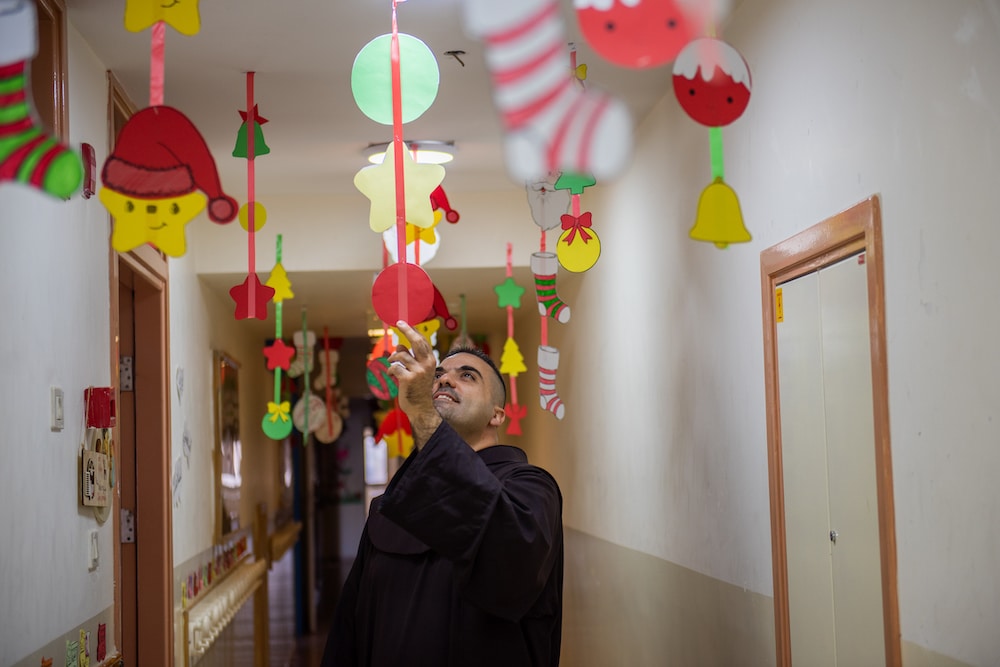
Father Haddad, 41 years old, a Franciscan friar with a background in engineering and a priest for nine months, arrived as the director in September. It was just enough time to learn to navigate the corridors of the school’s two labyrinthine buildings, and then the war broke out. “We never closed, except for a few days,” he said. “As directors of Catholic schools, we opposed the government’s decision to close and switch to online learning, as public schools did. We believe that now more than ever, students need to come to school, be together, learn to confront and dialogue.”
The older students were born in 2006, at the end of the Second Intifada, and they have absorbed the words of that time: weapons, tanks, war and resistance. These words resurface with every conflict. Father Haddad and his staff — over a hundred people including teachers and administrators — try to find the right words to motivate them to continue in their academic efforts, “We try to help them understand that education, coming to school, and studying are important methods for carrying on our presence. This is our land, the one where we were born and raised, and education is ‘resistance,’ our ‘weapon’ to defend our land. It’s not an easy message, but we try to find the right words and speak in a balanced way.”
Education comes from school but also from contexts like the parish. Father Issa Hijazin ministers to the youth of his parish in Beit Sahour, who are becoming increasingly frustrated. Father Hijazin has been the parish priest in Beit Sahour since 2019. In the surrounding fields, the shepherds heard the announcement of the birth of the savior from the angels and went “without delay” to the Grotto to witness the great event proclaimed to them (Lk 2:9[1] ). A few months after the start of his ministry as a parish priest, the COVID-19 pandemic broke out. Now, he faces the war, which is affecting many of his parishioners economically.
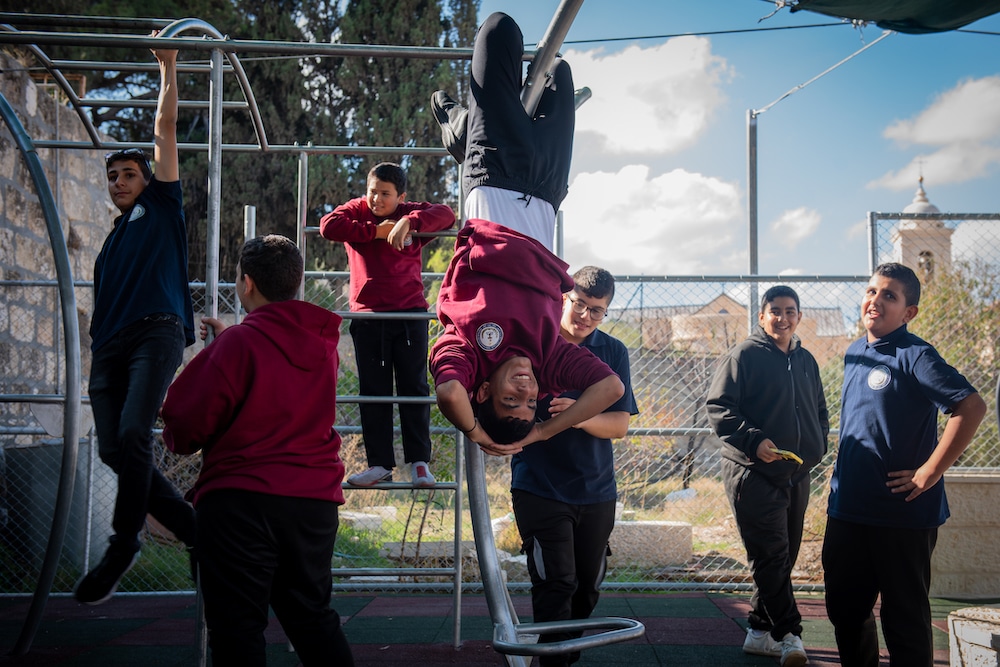
Father Hijazin is very creative and has already implemented support initiatives for those who have lost their jobs. But his main concern is young people. It is necessary for them to use their time constructively rather than filling their eyes and minds with images and words of war. “Our young people are frustrated, unable to see a clear future ahead,” and perhaps when all this is over — he admitted — many of them may try to leave. But it is with the words and closeness that we express now that the future is built. “We don’t want what happened to have a negative impact on them,” Father Hijazin said, “so we must listen to their concerns and be ready to address their questions.”
Several meetings have been held for the youth in the parish. Many young people have started attending Sunday Mass again. The Mass, too, serves as a moment to convey a message of truth and hope. “As a Church, we strive to communicate differently from others. We stand against violence and war, not against people. We stand in solidarity with the weak, regardless of their country, as this is our faith and mission as Christians in this land and in this situation.”
Another project of the Franciscan friars offers a future for boys in Bethlehem who come from struggling families. About 20 boys, residents of the Franciscan Boys Home, play in the garden overlooking the Basilica of the Nativity and the entire city of Bethlehem after school. Father Sandro Tomašević, who has been caring for them as the house manager for three years, is always with them. He is a true father to them. “We try to give them a roof, food, education, but above all, love. It is only this that can remain in their hearts as a seed of peace.” This year, like every year, there will be a Mass a few days before Christmas, and Santa Claus will arrive to bring gifts. “Love is the only investment for the future,” Father Tomašević added, “and this Christmas, we want to ask that every heart be touched by the love that Jesus brings.”
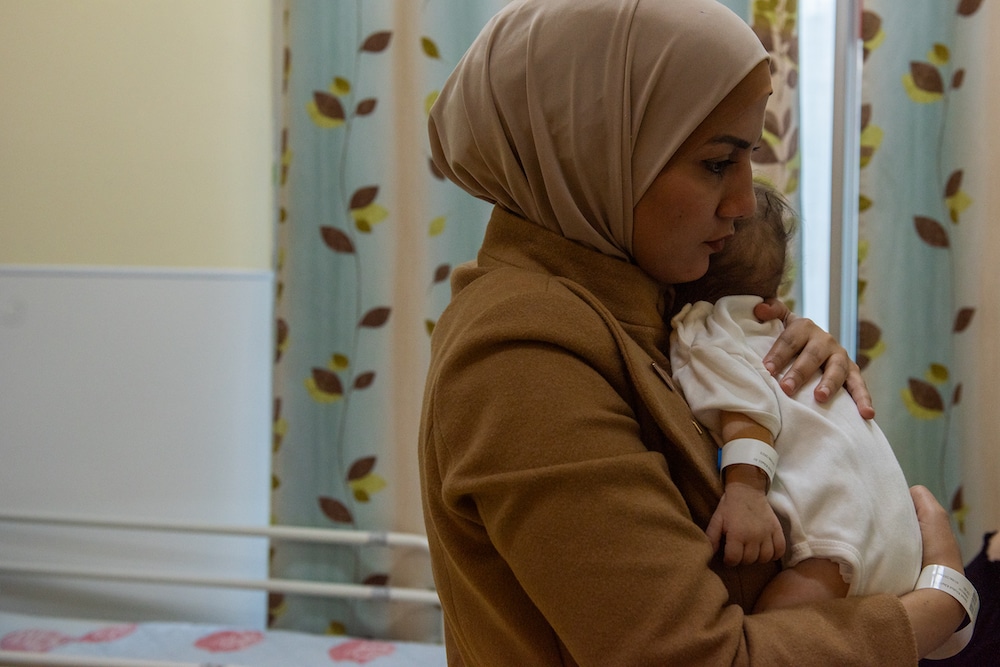
The light of mercy
The main entry point to Bethlehem, Checkpoint 300, has been closed to vehicular traffic since Oct. 7. Just a few hundred meters away stands the Caritas Baby Hospital, a Catholic pediatric hospital founded in 1953 by joint Palestinian-Swiss efforts. Today it’s the only pediatric hospital in the West Bank. Every year, it provides approximately 50,000 treatments to Palestinian children spanning in age from infancy to 18 years of age, serving many from the southern reaches of the West Bank. The medical director, Dr. Hiyam Marzouqa Awad, started her career here in 1990, just after she finished medical school. “We are open to every child. We don’t look at religion or ethnic background … really we concentrate on the child. Our mission is to improve the health outcomes of children in Palestine. They have the right to be healthy and should get the best medical care possible.”

Since Oct. 7, when the war broke out, the hospital has been receiving fewer children because of difficulties in moving between Palestinian villages and towns due to roadblocks and closures enforced by the Israeli army: “Sometimes one entrance is open, but after two hours it would be closed, and that discourages people from reaching us, because maybe they can enter but they cannot go back to their homes.” Even for the hospital staff using an ambulance, reaching patients is challenging. Nevertheless, Caritas Baby Hospital activated its emergency plan from the first day of the conflict. The plan involves, among other things, distributing medications for chronic cases in larger quantities and establishing a hotline that people can contact for medical advice and information.
“There is a kind of pride in us for being born in Bethlehem: just as Baby Jesus was born in Bethlehem, we too were born in Bethlehem. And as a pediatrician, in every child we help at the hospital, I see Baby Jesus.”
— Dr. Hiyam Marzouqa Awad
Dr. Awad is a Christian originally from Bethlehem: “There is a kind of pride in us for being born in Bethlehem: Just as Baby Jesus was born in Bethlehem, we too were born in Bethlehem. And as a pediatrician, in every child we help at the hospital, I see Baby Jesus.” Usually, every year at this time the hospital is adorned with Christmas decorations. “Each department has its own Christmas tree, sparking a genuine competition,” said Dr. Awad. This year the mood is different: “I’m waiting for Christmas with sadness. I would love to feel the joy of Christmas, but there are no lights, decorations, or anything festive in the place where Jesus was born. It is the first year it has happened since I remember.” Her thoughts go to the children who suffer on both sides of the conflict, especially to the many innocent lives lost in Gaza. “Sometimes I feel powerless for not being able to help fellow human beings. At this time there’s no way to receive children from Gaza, but we’re ready to do whatever’s needed to help.”
The light of family
Eliana and her husband, Wael, are trying to build a life for their family. Currently, they are paying a mortgage for a new home while also paying rent for a house in Beit Jala, on the opposite side of Bethlehem. That’s where Eliana welcomed us, where she currently lives with her husband and two daughters. Well-known Christmas songs played in the background. “For us Christians in Bethlehem, this is the only time of the year when we feel free to express our joy in being Christians.” In the days leading up to our visit, they decorated a large Christmas tree together. “Bethlehem is small, and we are surrounded by the wall, but during this time, we can express our happiness! Usually, among family, we greet each other saying, ‘Christ is born!'”
But this year, there is also turmoil in Eliana’s home: the hotel where she works is closed, her husband is currently unemployed, and they are uncertain when they will be able to move into their new house. “The only thing that sustains us is our faith,” she said. “It’s the only ‘weapon’ we have. As Christians, we are less than one percent; we try to stay here to protect the holy site, but without faith, it’s almost impossible to move forward.”
“The only thing that sustains us is our faith. It’s the only ‘weapon’ we have. As Christians, we are less than one percent; we try to stay here to protect the holy site, but without faith, it’s almost impossible to move forward.”
— Eliana
Her two daughters look forward to Christmas all year. “We’ve talked to them about the meaning of Christmas; they know what it’s about. When my older daughter wants something, she asks Jesus because she knows he listens; she realizes who he is. Just today, she said to me, ‘We need to buy things to make a cake because Jesus’ birthday is approaching.'”
Another Bethlehem family shared the joy of their daughter’s birth. A little girl, Nilay, was born on Oct. 20. By then the war had already been raging for two weeks. On Sunday, Dec. 3, her parents took her to church for the first time at the Latin parish of Bethlehem, filled with parishioners gathered for Mass to celebrate the first Sunday of Advent. In Bethlehem, it is customary to present babies to the community 40 days after birth. Nilay was welcomed at the offertory by Father Francesco Patton, OFM, the custos of the Holy Land (the Franciscan minister provincial in the Middle East), who presided over the Mass. At the end of the celebration, the little one received a special blessing from the parish priest.
Nilay’s mother, Irene, experienced the latter part of her pregnancy and the early months of her daughter’s life with mixed feelings: “Being a mother is something beautiful, but the overall situation we are living in is really difficult.” As Christians, Irene and her husband Hanna wanted to bring their daughter to church “to entrust her to the Lord.” They pray to God to help them take care of her and that He Himself takes care of her and saves her. Irene and Hanna have not lost hope of spending a peaceful Christmas. “We hope that by Christmas, everything will be over, and everything will turn for the better.”
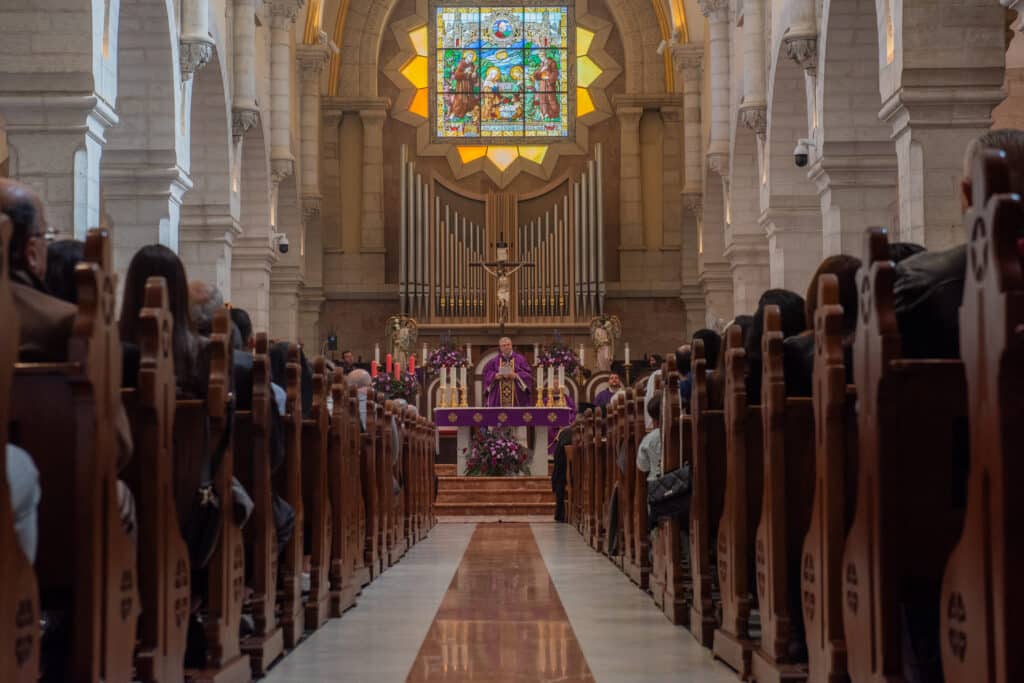
The light of faith
On Saturday, Dec. 2, on the eve of Advent, the custos of the Holy Land made his traditional solemn entrance into Bethlehem. Father Patton traveled from Jerusalem, where he lives, and passed through Checkpoint 300 to visit the tomb of Rachel. “For me, it is the most meaningful gesture,” Father Patton said. “It means continuing to affirm that even a wall can be crossed. It is a sign that sooner or later, there will be no more walls.”
The Franciscan friar walked in procession along Star Street, winding through the heart of Bethlehem — the route traditionally believed to have been taken by the Holy Family. The town was empty; the streets, usually crowded with tourists and pilgrims, stood deserted. Drums and bagpipes were silent as a mark of mourning and solidarity with the Palestinian people in Gaza. The group of scouts, a handful compared to the several hundred who typically arrive from across the country each year, proceeded in silence with their hands behind their backs.
Yet, whether the steps are joyful or sad, and the streets silent or noisy, at the end of the road, there is always the Basilica of the Nativity. The custos and the Franciscan friars accompanying him venerated the place where Jesus was born, now marked by a silver star. A few steps away in the manger, the custos lit the first candle of the Advent wreath. “We have come to Bethlehem on a pilgrimage,” he said. “In the Grotto and in the Manger, we welcome and adore the Prince of Peace. Only the peace of Christ is true peace; the peace of the world is at best a truce or an armistice. We want to ask the Child of Bethlehem for the gift of peace for this land,” he added.
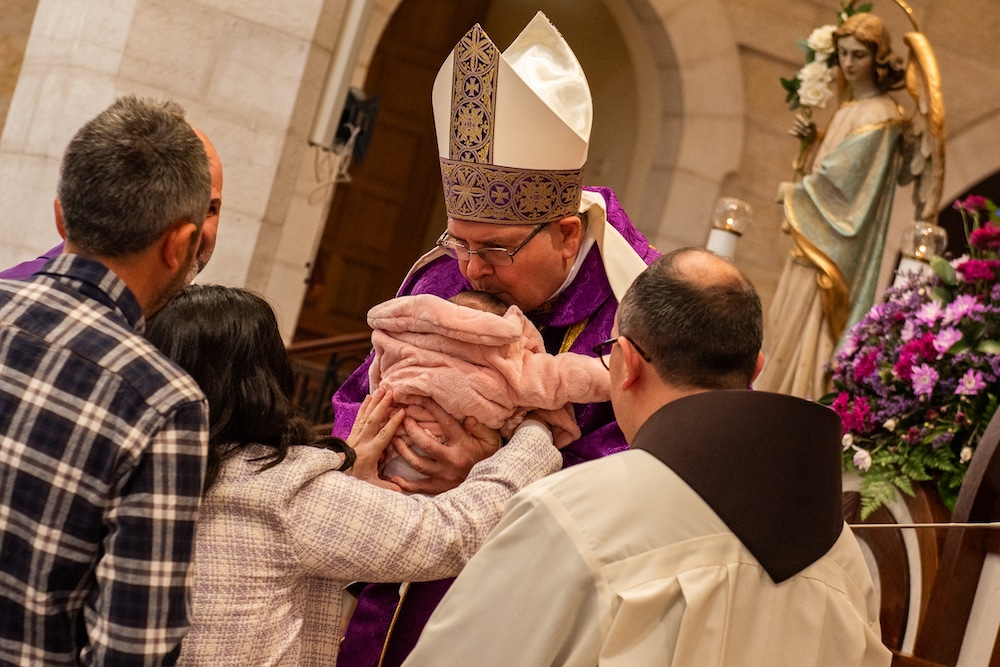
In a recent interview, he spoke about how Christians are called to live Advent and prepare for Christmas. “Advent makes us look ahead to the return of Jesus. In Advent, we reflect on the fact that being in history means being in the middle of wars, persecutions, pandemics and economic crises and being people who do not withdraw into ourselves, but — as Jesus says — ‘when these signs begin to happen, stand erect and raise your heads because your redemption is at hand[2] ‘ (Lk 21:28). It is God who guides history, according to times that are not our own, toward that final point, which will be the encounter with His Son, Jesus.”
Bethlehem awaits Christmas
On Dec. 24, the Latin Patriarch of Jerusalem, Cardinal Pierbattista Pizzaballa, will solemnly enter Bethlehem and then celebrate Midnight Mass. It will be his first entrance to Bethlehem as a cardinal (he was created cardinal during the consistory held in Rome on Sept. 30). A visit had been scheduled for November but was canceled due to the constraints of the war and, above all, to maintain an atmosphere of sobriety.
Light will come again to Bethlehem. Even now, the lights of learning, compassion, family and faith pierce the gloom. Even if on Dec. 24, celebrations will proceed in a subdued manner, the feast of our Savior’s birth will be marked again in the place where 2,000 years ago the infant face of Christ was first seen by men. Singing “Glory to God in the highest” and ringing bells at Midnight Mass, Christians will announce once again to the whole world, from Bethlehem, that beyond all the walls and wars of men, God still chooses to come and dwell among us and give us his peace.

